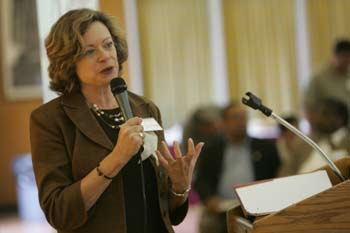
Rev. Pamela Cooper-White, Ph.D., delivered the keynote address at the Partners in Healing Conference at Fordham.
Photo by Bruce Gilbert
Spiritual counselors, health-care workers, psychologists, social workers and members of the clergy convened at Fordham University’s Rose Hill campus on Sept. 22 for the seventh annual Partners in Healing Conference.
The daylong conference, “Loss, Illness and Death in Dialogue with Theology and Psychology,” featured several workshops and a keynote address by Rev. Pamela Cooper-White, Ph.D., author and associate professor of pastoral theology at Lutheran Theological Seminary in Philadelphia.
Rev. Cooper-White, author ofMany Voices: Pastoral Psychotherapy in Relational and Theological Perspective(Fortress, 2006), Shared Wisdom: Use of the Self in Pastoral Care and Counseling (Fortress, 2004), called on those providing pastoral care to parishioners who are ill and dying to consider the ways the Holy Trinity reveals a complex and nuanced view of God and outlined a “new pastoral Trinitarian formula” in order to help caregivers.
She said that the Trinity should be intrinsic to the work of caregivers and their relationship with those in need. In Christianity, the Trinity is the doctrine that God is one being who exists in three persons: the Father, the Son and the Holy Spirit.
Rev. Cooper-White said it is important for those receiving pastoral care “to be led from fear to trembling hope to freedom.”
“God is in us, deep in our blood and in our bones, and we are in God,” she said. “… God is in the whole energy of justice and mercy.”
The conference was sponsored by Fordham’s Graduate School of Religion and Religious Education (GRE), Partners in Healing, Radio Vision Cristiana and the Sisters of Charity of Halifax.
Rev. Cooper-White said this model is cutting edge but is threatening to some in the field, who want to be seen as experts. “And it’s costlier,” she said. “You take into your body the reality of another person. It’s an energy-giving and energy-demanding way of working.”
Following the keynote, participants attended a panel discussion and workshops, including “Medical Issues, Loss and Death” and “Non-Anxious Presence: Families Living with Illness and Loss.” Among the participants were Michael Diaz, M.D., clinical professor of medicine at Mt. Sinai Medical Center, and John Shea, Ph.D., visiting professor in the Institute of Religious Studies and Pastoral Ministry at Boston College.
In a first for the conference, three of the workshops were presented in Spanish.
